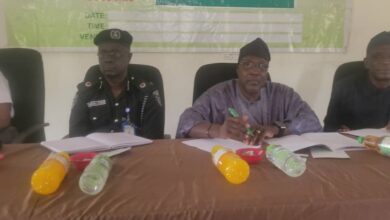Hafsoh’s Murder: Abdulrahman’s Courtroom Display, Emotional Reaction Of Discharged Suspects, Defence Lawyer’s Antics, All The Drama And Details Of Death By Hanging Judgement * Emir, IEDPU hail verdict

By Bamidele Aremu and Damola Kadri
The Kwara State High Court, presided over by Justice Hannah Ajayi, on Thursday sentenced Abdulrahman Bello, the prime suspect in the murder trial of a graduate of Kwara State College of Education, Hafsoh Lawal to death by hanging for culpable homicide, bringing closure to a case that sparked widespread condemnation and emotional calls for justice across the country.
In addition to the capital sentence for culpable homicide, Justice Ajayi imposed a 10-year jail term on Bello for the unlawful possession of human blood and body parts, with an option of ₦100,000 fine or a further six-month imprisonment.
Four other defendants, Ahmed Abdulwasiu (41), an Islamic cleric; Suleiman Muyideen (28), a Neolife agent; Jamiu Uthman (29), a phone repairer; and Abdulrahmon Jamiu (31), a farmer were discharged and acquitted after the court found no sufficient evidence of conspiracy.

The final judgement attracted a huge turnout, with many who came to witness the day’s proceedings arriving the court premises as early as 7am.
The situation became chaotic when the courtroom was opened as people pushed and shoved to gain entry. The grieving family of the victim, including the father were not left out of the struggle to get into the courtroom.
A word of caution from a voice in the crowd received angry reaction from the family. Within a few minutes after opening the door, the courtroom was filled to the brim, with atmosphere tensed with expectation.
Abdulrahman and the four others were brought into the courtroom at approximately 9 a.m, accompanied by armed officers of the Nigerian Correctional Centre. The entrance of the suspects caused a stir as everyone jostled to catch a glimpse of them.
Abdulrahman, of course, was the star attraction. He was the one every eyeball bulged and every neck craned to see.
It was the last day of the trial and the prime suspect appeared to dress for the occasion. Gone was the brown Jalabia which he had worn since the trial started. Jalabia that had become faded and frayed. On this day, Abdulrahman turned out in a new ash-coloured Jalabia. His head was shaven. He was visibly thinner,his eyes hollowed.
Three of the other suspects dressed in white Jalabia, with nose masks while the fourth dressed in wine colour Jalabia.
With the proceedings commencing, the kwara state Director of Public Prosecution, Barrister Ayoola Akande announced his presence and introduced members of his team. However, Counsel to Abdulrahman, Barrister Chukwudi Maduka was absent, but was represented by Barrister Boluwatife Adeyanju. Lawyers representing the other four suspects also announced their presence.
The five counts charge which Abdulrahman and four others were on trial for included; conspiracy, disembering of human parts, possession of human parts, removal of human parts and rape violated multiple laws, including Sections 97 and 221 of the Penal Code Law; Section 2 of the Kwara State Prohibition Law on Dealing in Human Parts (Law 4 of 2018); and Section 1(2) of the Robbery and Firearms (Special Provisions) Act, CAP R11, Laws of the Federation of Nigeria, 2004.
Reading out her judgement, Justice Ajayi went through the arrest, investigation, interrogation and submission of the suspects as well as the evidence presented to the court as exhibits.
Ruling on the four other suspects, Justice Ajayi pronounced them innocent of the charges against them as the court found no sufficient evidence of conspiracy in the crime committed. Consequently, they were discharged and acquitted.
The judge’s pronouncement sent the freed suspects into jubilation. They knelt down in the dock, raised their hands in gratitude and shed bitter tears that pull the emotion of the people witnessing the proceedings. Abdulrahman on his part, put his hands on his cheeks, resting his head on dock as he awaited his fate.
Done with the four accused, Justice Ajayi turned attention to Abdulrahman’s case.
In her ruling, the judge condemned the act committed by the defendant as an extreme display of cruelty and inhumanity. She emphasized that the accused’s courtroom defense only reinforced the fact that he had a premeditated plan to kill the victim for a money ritual.
The judge dismissed his claims of love and intention to marry the victim as fabrications designed to mislead the court, labeling them as deliberate falsehoods.
She further noted that the convict’s behavior following the crime, prior to being apprehended by security agencies, suggested that this might not have been his first involvement in such a heinous act. The court affirmed that both the video recordings and written confessions obtained by the Department of State Services (DSS) and the police were lawfully acquired and met the legal standards of the state.
Additionally, Justice Ajayi declared that there was no credible evidence indicating that the suspect was assaulted or injured during police interrogation. She remarked that the accused failed to demonstrate credibility as a witness, and his explanations were inconsistent and appeared to be concocted after his arrest. The judge also noted that, a book detailing money ritual practices was found in his home, further implicating him.
While the judge was reading out her submissions, Abdulrahman initially bowed his head and seemed to close his eyes. Later, he rested his elbows on the deck and clasped both hands on his head. He appeared to be sleeping or in a trance. He remained in that state for close to two hours until the judge was ready to pronounce her verdict. The judge turned to him, but he didn’t seem to hear what was being said or if he was being addressed. He remained in that trance-like state until the court clerk called his name sharply, jolting him back to life.
The judge pronounced him guilty and sentenced him to death by hanging. The court clerk interpreted the verdict to him in Yoruba.
What however stunned the packed courtroom was not just the guilty verdict but the eerie smile that crept across Abdulrahman’s face as Justice Ajayi pronounced the sentence. Yet, when it came time for him to speak during the allocutus (a chance given to a convicted person to plead for mercy), Bello could not utter a word. He simply stared ahead in silence. Before the sentence, his legal counsel Boluwatife Adeyanju urged the court not to award maximum punishment. He said he’s a young man with no formal criminal records, saying he has shown remorse.
Hafsoh’s father, Ibrahim Adefalu Lawal, sat calmly throughout the proceedings, visibly filled with emotion. When the judge sentenced Abdulrahman to death, while the courtroom erupted in jubilation, he remained quiet, soaked in grief, holding in the waves of emotion stirred by the sense of justice for his daughter.
Justice Ajayi however, took time to caution the public, particularly youths, about the dangers of social media influences. She remarked that the tragic death of the young woman might have been avoided if she had informed family or friends about her plans to visit a man she met on Facebook.
The incident, which occurred on February 10, 2025, in the Olunlade area of Ilorin, Kwara State, sparked widespread outrage and drew attention both within and beyond the state.
Outside the courtroom, the atmosphere was electrifying and emotional as the news of the judgment filtered through, loud cheers erupted from the crowd outside the court room.
Efforts to get the reaction of Bello’s lawyer were not successful as he refused to speak with journalists.
Speaking to National Pilot after the court session, Hafsoh’s uncle, Adefalu Abubakar Lawal, expressed satisfaction with the outcome.
“We thank God and the court. We are impressed with the ruling. Since this case began, not a single member of the suspect’s family reached out to us or showed any remorse. This verdict sends a strong message,” he said.
When asked if Abdulrahman’s family made contact to the the deceased family while the case was ongoing, Adefalu simply declared that: “there was nothing of such, because I think they’ve seen the case as the one that any of Abdulrahman’s family wouldn’t try to comeout either by pleading to the family of the deceased. Some of them were coming but they were hiding their faces. There was a time, a lady claimed to be living in Abdulrahman’s area. She claimed that nobody supported the act that got him arrested for killing Hafsoh Lawal Adefalu”
The Emir of Ilorin and Chairman Kwara State Traditional Rulers Council, Mai-Martaba Alhaji (Dr) Ibrahim Sulu-Gambari CFR, hailed the judgement delivered by Justice Hannah Olushola Ajayi, which convicted the Abdulrahman Bello to death by hanging.
Alhaji Sulu-Gambari in a statement issued by his Press Secretary, Dr. Abdulazeez Arowona, noted that, “the gruesome murder of Hafsoh Yetunde Lawal was pathetic, unfortunate, regrettable and worrisome.
“The killing of Hafsoh is one of the greatest evil on earth which we pray not to ever experience again.
“The judgement has further brightened the hope and trust of the people in the judiciary and security agencies. May Almighty Allah repose the soul of late Hafsoh Lawal and comfort his family members.”
Alhaji Sulu-Gambari however appealed to parents and Guardians to be vigilant and watch over their children and wards in order to curb re-occurence of such dastard acts.
The Chief Imam of Ojatuntun, Sheikh Abdulfatai Arowolo expressed gratitude to Allah for the seamless verdict and the entire proceedings.
” We express gratitude to Almighty Allah and this Honourable Court for dispensing justice efficiently delivering a timely verdict without undue delay,” he said.
Also, Ilorin Emirate Descendants Progressive Union (IEDPU), the umbrella sociocultural organisation of the people of Ilorin Emirate in Kwara State, expressed profound satisfaction with the death sentence passed on AbdulRahman.
The union, in a statement, said that it has been following the judicial proceeding with absolute interest right from its commencement.
The statement expressed the hope that the verdict would be swiftly executed, saying that it would discourage ritual killings and similar negative tendencies.
The union commended the Kwara State Government, the judiciary and other stakeholders for ensuring that justice prevailed on the matter.
The statement commisserated with the family of the late Miss Lawal,saying the judgement has shown that “evil shall never prevail on righteousness”.





